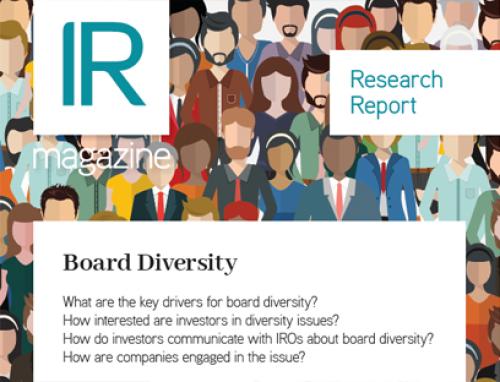To get a job in IR today probably requires even more effort and focus than it did just a few years ago. This is because IR is better recognized as a profession and a bona fide career path to the most senior levels. This means most people in the broader financial industry are aware of IR, what it is, the technical skills needed to do a good job and what a real difference effective IR can make to a business, its investor communications and the perceived value of the investment story.
John Gollifer, general manager at the UK’s Investor Relations Society, says the prerequisites for a job in IR at any level are as follows:
- Knowledge of how the City works, its constituents and its language
- The right experience in one of the main areas of in-house activity, such as on the buy side or sell side. There are, of course, other advisory roles that should lend themselves to a future role in IR, too
- An IR qualification to make you stand out. This must help given the number of people thinking about a move into IR. Naturally, Gollifer recommends the IR Society’s Certificate in IR.
Assuming you have the right background as outlined above, Gollifer adds that new IR entrants should also get networking. ‘After that, it’s really down to you, your level of experience and your ability to persuade any company that you can do the job, whether or not you have done the IR role before,’ he says.
Another highly informed perspective comes from London-based board development and executive search consultancy Fidelio Partners.
Gillian Karran-Cumberlege, who leads Fidelio Partners’ board practice, notes the following: ‘IR is obviously a desirable career function, operating at the interface between the company and its shareholders with substantial exposure to the senior leadership team. It is also a complex role and IROs require a rare blend of skills: capital markets experience, strong finance skills, an understanding of the company, a grasp of governance and communication skills, and gravitas and the ability to influence.’
And while Karran-Cumberlege notes that one of the traditional avenues into IR – via investment banking and, particularly, the sell side – is still a viable route, ‘we have seen a shift in recent years toward greater emphasis on corporate experience – that is, the ability to work within a company’, with financial, rather than communications, experience also having risen in importance.
A track record in IR is often listed as a key attribute for candidates, too. ‘This creates a challenge: if you have not previously worked in IR, it is often difficult to transition into the function,’ says Karran-Cumberlege. But that doesn’t mean it’s not possible. Most important, when moving into IR, is demonstrating a meaningful interest in the function, adds Karran-Cumberlege: ‘Sometimes candidates exhibit a casual commitment and this is simply not enough.’
What you need to succeed in IR is an in-depth understanding of the role and the nuts and bolts of the function. ‘An effective way of doing this is by engaging with IROs and understanding the challenges they face,’ says Karran-Cumberlege. ‘One forum for connecting and keeping abreast of trends in IR is through the many professional membership bodies such as the UK’s IR Society, Dirk and NIRI, as is studying for and acquiring formal IR or valuation-related qualifications.’
You also want to get yourself on the right radar screens. Decision-makers for the IR role are the CEO and CFO but this extends to the investors in the sector. You should also reach out to recruiters in this space and ensure that IR credentials are front and center on both your CV and your digital profile.
‘An effective IRO can have a meaningful impact on valuation,’ concludes Karran-Cumberlege. ‘To secure that role in IR, you should be able to make that connection.’










